Dealing with stubborn clogs in your drains? Drain cleaners can be a quick and effective solution to unclog your pipes.
In this article, we explore the different types of drain cleaners available, including chemical, enzymatic, and homemade options. We also discuss important factors to consider when choosing a drain cleaner and provide a list of the top drain cleaners on the market.
Find out tips on how to use drain cleaners safely and effectively, as well as alternative methods for unclogging drains. If you're tired of dealing with blocked pipes, keep reading to discover the best drain cleaner for your needs!
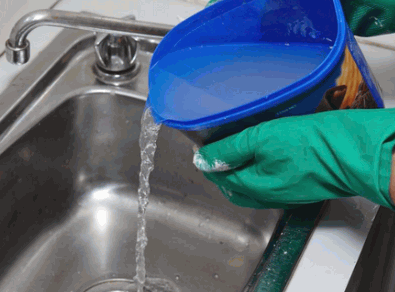
What Are Drain Cleaners?
Drain cleaners are products designed to remove clogs in pipes caused by various substances such as hair, grease, and other debris. These cleaners come in different forms and compositions to effectively break down blockages and restore proper drainage.
Chemical drain cleaners typically use strong corrosive chemicals to dissolve clogs, while biological drain cleaners rely on enzymes to digest the organic matter causing the blockage. Additionally, mechanical drain cleaners like drain snakes or plungers physically dislodge the obstruction. The main goal of these products is to provide a quick and efficient solution to common plumbing issues, preventing the need for costly repairs or professional intervention.
Types Of Drain Cleaners
Regarding drain cleaners, there are primarily three types commonly used: chemical drain cleaners, enzymatic drain cleaners, and homemade drain cleaners. Each type has its unique composition and method of clearing clogs.
Explore further: Can You Use Drain Unblocker In Washing Machine
Chemical Drain Cleaners
Chemical drain cleaners are powerful solutions that contain caustic or oxidizing agents to break down clogs in PVC or metal pipes. These cleaners are known for their fast-acting properties but require caution when handling due to their chemical composition.
When using chemical drain cleaners, it is crucial to follow specific safety measures to avoid accidents or damage. The effectiveness of these cleaners lies in their ability to dissolve hair, grease, soap scum, and other organic material that cause blockages. It is essential to note that the strong chemicals in the cleaners can also damage certain types of pipes, particularly old or corroded ones. Therefore, it is recommended to consult a professional plumber before using chemical drain cleaners in case of uncertainty about the type of pipe material.
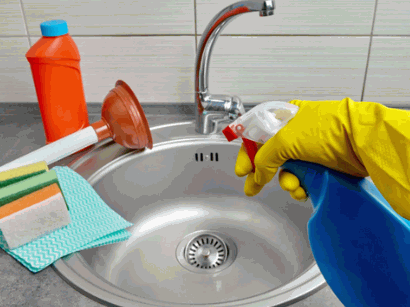
Enzymatic Drain Cleaners
Enzymatic drain cleaners utilize bacteria and enzymes to break down organic matter and clear blockages in plumbing systems. These cleaners work gradually but are often preferred for their eco-friendly and non-corrosive nature.
When these cleaners are poured into a clogged drain, the bacteria and enzymes start to feed on the organic materials causing the blockage, and breaking them down into smaller particles. The gradual action of the enzymes ensures that the pipes are not damaged during the cleaning process, making them a safe option for both the user and the environment.
By targeting the root cause of the clog, these cleaners help prevent future blockages, reducing the need for frequent plumbing maintenance.
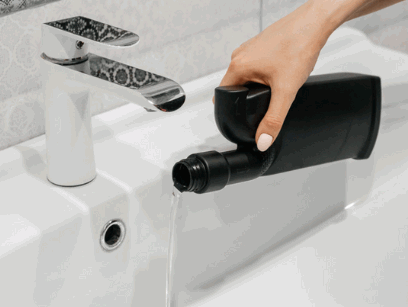
Homemade Drain Cleaners
Homemade drain cleaners are DIY solutions made from common household ingredients like vinegar and baking soda. These natural alternatives offer a gentler approach to clearing minor clogs and are considered safer for both pipes and the environment.
Not only are homemade drain cleaners effective at breaking down debris and clearing blockages, but they are also much more affordable than store-bought chemical cleaners. By utilizing ingredients found in most kitchen cabinets, individuals can save money while reducing their environmental impact. Along with being cost-effective and eco-friendly, DIY drain cleaners are easy to make and use, requiring minimal effort to mix and pour down the drain. Users can feel confident that they are not exposing themselves, their families, or their plumbing systems to harsh chemicals, making homemade drain cleaners a smart and practical choice for maintaining clean and smoothly flowing drains.
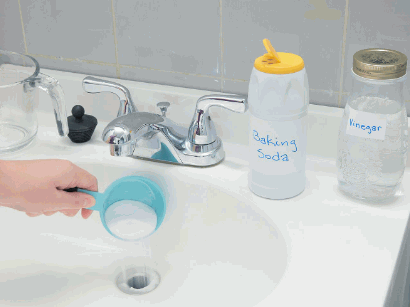
Factors To Consider When Choosing A Drain Cleaner
When selecting a drain cleaner, it is essential to consider several factors such as the type of clog, the material of the pipes, safety precautions, and the environmental impact of the chosen product. These considerations ensure the effective and responsible use of drain cleaners.
Type Of Clog
The type of clog, whether it is caused by hair, grease, soap scum, or mineral buildup, plays a crucial role in determining the most effective drain cleaner to use. Different clogs may require specific formulations to achieve optimal results.
For instance, a clog primarily composed of hair will often necessitate a drain cleaner with strong enzymatic properties that can break down the protein structure of the hair clusters. On the other hand, a clog resulting from grease buildup might be best tackled with a degreasing agent that can effectively dissolve the fatty residues.
- Soap scum, a common culprit in drain blockages, typically responds well to acidic cleaners that can help disintegrate the soap residue's film-like texture.
- When dealing with mineral buildup clogs, such as those caused by hard water deposits, using a descaling cleaner that targets limescale and calcium deposits is key to restoring proper water flow.
By understanding the composition of the clog, individuals can select the most appropriate drain cleaner tailored to their specific plumbing issue, ensuring a quick and efficient resolution without causing damage to the pipes or environment.
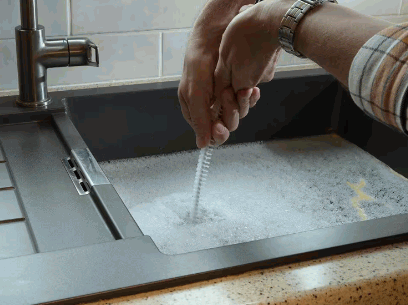
Type Of Pipes
The material of the pipes, whether PVC or metal, must be considered when selecting a drain cleaner. Certain chemicals may interact differently with pipe materials, affecting the efficacy of the cleaning process and potentially causing damage.
For PVC pipes, it is crucial to avoid using acidic cleaners that can corrode the plastic and lead to leaks or weakened pipe structures. On the other hand, metal pipes are more resilient but still susceptible to damage if exposed to harsh chemicals, especially those containing strong acids or abrasives. To ensure the longevity of your drainage system, opt for cleaners specifically formulated for the material of your pipes. By choosing the appropriate drain cleaner, you can effectively clean your pipes while minimizing the risk of corrosion or degradation during the cleaning process.
Safety And Environmental Impact
Safety considerations and environmental impact are critical factors when selecting a drain cleaner. Understanding the potential risks associated with chemical cleaners and the ecological benefits of enzymatic or eco-friendly alternatives is essential for responsible usage.
Choosing the right drain cleaner involves more than just clearing clogs; it requires a thoughtful approach that prioritizes both safety and sustainability. The harsh chemicals in traditional drain cleaners can pose health hazards to both users and the environment, contributing to water pollution and harming local ecosystems.
Opting for eco-friendly options not only helps in preventing potential dangers but also promotes a healthier living environment for all. By selecting enzymatic or natural drain cleaners, you can effectively tackle blockages without compromising on safety.
Top Drain Cleaners On The Market
Several top-rated drain cleaners dominate the market, including Liquid-Plumr Pro-Strength Full Clog Destroyer, Drano Max Gel Clog Remover, and Green Gobbler Drain Clog Dissolver. These products have been tested and recommended by experts for their effectiveness.
Liquid-Plumr Pro-Strength Full Clog Destroyer
Liquid-Plumr Pro-Strength Full Clog Destroyer is a highly effective drain cleaner that has undergone rigorous testing by the Good Housekeeping Institute. Its powerful formula is designed to dissolve tough clogs and restore smooth drainage.
One standout feature of this product is its ability to work quickly, providing relief from stubborn clogs in no time.
The unique formula of the Liquid-Plumr Pro-Strength Full Clog Destroyer contains powerful ingredients that target and break down the toughest blockages with ease.
The addition of this product to your cleaning arsenal can ensure a hassle-free experience when dealing with troublesome drains.
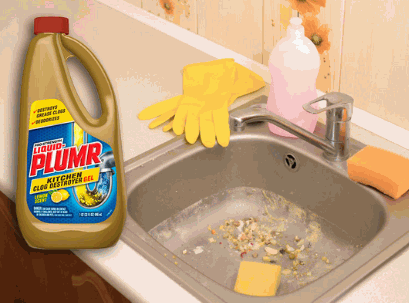
Drano Max Gel Clog Remover
Drano Max Gel Clog Remover is a popular choice for clearing clogged drains, toilets, and septic systems. Its powerful formula can break down various types of blockages quickly and effectively.
Whether it's hair, soap scum, grease, or other organic matter causing the blockage, Drano Max Gel Clog Remover can tackle them all with ease. Its thick gel consistency clings to pipes and works its way through the toughest clogs without the need for harsh chemicals. This product is not only efficient in unclogging common household drains but also safe for use in septic systems. The reliability and versatility of Drano Max Gel make it a go-to solution for homeowners dealing with plumbing issues.
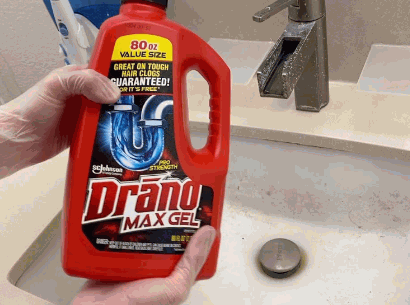
Green Gobbler Drain Clog Dissolver
Green Gobbler Drain Clog Dissolver is an eco-friendly option that utilizes enzyme cleaners and beneficial bacteria to safely dissolve clogs. This septic-safe product offers a natural and efficient solution for maintaining clean and clear drains.
By utilizing the strength of enzymes and bacteria, the Green Gobbler Drain Clog Dissolver not only effectively breaks down tough blockages but also does so in a way that is gentle on the environment. Its formula works in harmony with nature, ensuring that your drains are free from clogs while also being mindful of ecological impact.
The use of enzymes and bacteria in this product makes it a perfect choice for septic systems. Instead of harsh chemicals that can harm septic tanks, Green Gobbler Drain Clog Dissolver provides a safe and eco-conscious alternative that won't disrupt the delicate balance of your septic system.
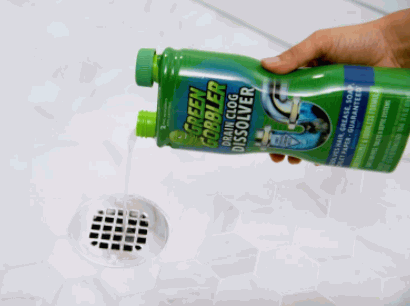
How To Use Drain Cleaners Safely And Effectively
Using drain cleaners safely and effectively requires following specific instructions, wearing protective gear, and disposing of used products responsibly. Proper usage ensures the desired results without compromising safety or causing harm to the environment.
Read And Follow Instructions Carefully
Before using drain cleaners, it is crucial to read and follow the manufacturer's instructions carefully. These guidelines outline the safety precautions, usage recommendations, and disposal methods to ensure user protection and environmental responsibility.
When handling chemical products like drain cleaners, the manufacturer's instructions serve as comprehensive guides that not only enhance the effectiveness of the product but also safeguard the user against potential risks. By strictly adhering to these instructions, individuals can minimize the chances of accidents and chemical mishandling.
Safety guidelines should never be overlooked when dealing with such potent substances. Ensuring proper ventilation, wearing protective gear, and avoiding any contact with skin or eyes are critical steps in preventing harmful exposure.
Use Protective Gear
When handling drain cleaners, it is essential to use appropriate protective gear such as gloves, and goggles, and ensure proper ventilation. These safety measures safeguard against exposure to potentially harmful chemicals and reduce the risk of accidents.
Wearing gloves is crucial to protect your skin from direct contact with caustic substances commonly found in drain cleaners. They act as a barrier, preventing chemical burns and irritation.
Similarly, goggles shield your eyes from splashes and fumes, which can cause severe damage if they come in contact with your eyes.
Ensuring adequate ventilation while handling drain cleaners is vital to minimize inhalation of toxic vapors, promoting a safer working environment for you.
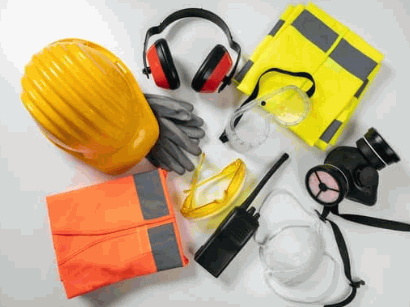
Properly Dispose Of Used Drain Cleaner
Disposing of used drain cleaner responsibly is vital to minimize its environmental impact. Proper disposal methods may include recycling containers, avoiding drainage into water sources, and following guidelines for handling hazardous waste.
When disposing of drain cleaners, it's crucial to be aware of the potential hazards they pose to the environment if not properly handled. Incorrect disposal methods can lead to contamination of soil and water sources, posing risks to aquatic life and human health. To avoid these consequences, consider neutralizing the used drain cleaner or contacting local waste management facilities for guidance on safe disposal procedures. Opting for eco-friendly alternatives, such as enzymatic drain cleaners or homemade natural solutions, can also help reduce environmental impact and promote a healthier ecosystem.
Alternative Methods For Unclogging Drains
Along with using drain cleaners, there are alternative methods available for unclogging drains effectively. These include plunging, utilizing a drain snake, and seeking assistance from a professional plumber for complex blockages.
Plunging
Plunging is a common method used to clear drain blockages by creating suction through the action of a plunger. This technique is effective for resolving minor clogs in toilets, sinks, and other fixtures.
When using a plunger, it's crucial to ensure a proper seal between the plunger and the drain opening. This seal is what enables the forceful plunging action to generate the necessary suction to dislodge the obstruction.
For toilets, the flange or opening at the bottom of the bowl needs to be covered entirely by the plunger. In the case of sinks, you may need to plug the overflow opening to focus the pressure on the clog.
Applying petroleum jelly around the rim of the plunger can improve the seal and enhance suction. Remember to plunge with rhythmic and forceful motions, rather than sporadic pushes, to maximize the effectiveness of this DIY method.
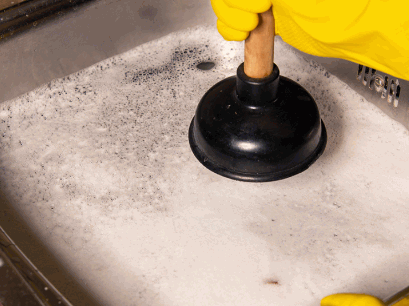
Using A Drain Snake
A drain snake, also known as an auger, is a tool designed to remove blockages from pipes by breaking through debris and obstructions. This method is effective for reaching deep clogs that are difficult to clear with conventional cleaners.
When using a drain snake, it is essential to first locate the clog by identifying where the water is backing up. Once you've determined the location, insert the end of the snake into the drain and rotate the handle clockwise to gradually push the snake farther down the pipe.
Important: Be sure to wear gloves and eye protection when using a drain snake to protect yourself from any potential splashback or debris.
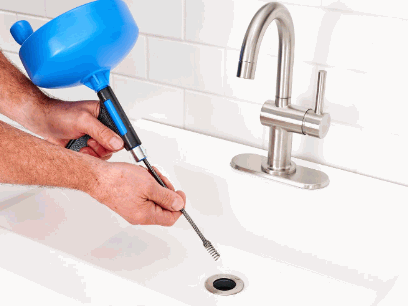
Calling A Professional Plumber
When faced with persistent or severe clogs, calling a professional plumber is advisable. Plumbers possess the expertise, tools, and experience to diagnose and resolve complex drain issues effectively.
Professional plumbers are well-trained in dealing with various types of blockages, whether it's due to grease buildup, tree roots infiltrating the pipes, or foreign objects obstructing the flow.
By engaging a skilled plumber, you can avoid the risks of causing further damage to your pipes or sewage system that could result from DIY attempts. Their specialized equipment, such as drain snakes, hydro-jetting machines, and video inspection tools, allows them to tackle the toughest clogs efficiently.
Knowing when to seek professional plumbing assistance is crucial. If you've tried basic home remedies without success or if you notice recurring clogs in multiple drains, it's time to call in a professional to prevent worsening the situation.
